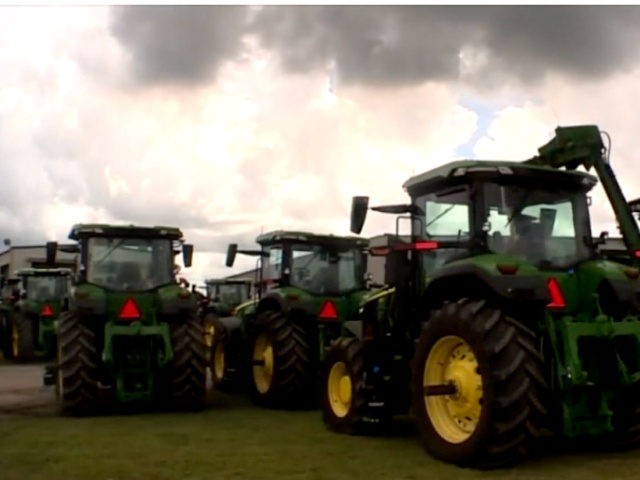Farmers stand to be hit hard by President Joe Biden’s supply chain crisis if they are unable to get the equipment they need before harvest time, NBC News reported Tuesday.
“Crops can be damaged if they are planted or harvested late, and the insurance provided by the Agriculture Department requires that seeds are put in the ground and produce is pulled by a particular date to be fully insured,” according to the report.
Matt Ackley, the chief marketing officer of Richie Bros. Auction, told the outlet that prices for farm equipment are also “growing considerably.” Richie Bros. Auction is reportedly one of the world’s largest auction sites “dedicated to the sale of heavy equipment.” Since last year, the price index for tractors has increased 19 percent.
“The company’s website, where it hosts online auctions, has attracted more than 161 million visitors and 1.3 million bidders in 2021 — that’s up by 15 percent and 19 percent respectively from the same time a year ago,” according to the report.
Ackley said the he is worried the increase and shortages could be exacerbated after 10,000 John Deere workers went on strike last week. The United Auto Workers union staged a walkout at 14 manufacturing plants due to the company refusing to increase wages above six percent after the company reported record profits this year.
“As you get any type of disruption, especially from an [original equipment manufacturer] standpoint — like this strike — to an already stretched supply chain, you get quite a significant backlog,” Ackley said. “People are fighting vigorously for what’s left.”
Farmers in Palm Beach County, Florida told WPTV many of the supplies they need are on back order.
“Labor is short, materials are short, and expenses are up,” said Eric Hopkins, the senior vice president of Hundley Farms.
According to the report, sugar cane stalks are supposed to be cutdown soon — a process that could be stalled because “parts to fix equipment are on backorder, and packaging and pallets are hard to come by.”
“We’re trying to be profitable out here, and the higher all of our costs of inputs goes, the more we have to charge the consumer, and everybody is going to feel this pinch,” he continued.
According to a Texas Farm Bureau report, supply chain disruptions and labor shortages have plagued the industry throughout the pandemic, causing retail prices to drastically rise with “no sign of slowing down anytime soon.”
The report continued:
The issues plaguing the economy affect every link of a supply chain, noted Kenneth Zuckerberg, CoBank lead grain and farm supply economist.
Agricultural retailers are no exception. With a steady need for crop inputs like seed and chemicals, farm suppliers are well positioned for a strong fourth consecutive season, Zuckerberg wrote.
But the raw inputs for many fertilizers, herbicides, pesticides and insecticides are manufactured overseas. If those are unavailable or in short supply, agricultural retailer and farm cooperative profits could decrease considerably.
Texas Farm Bureau (TFB) Associate Director of Commodity and Regulatory Activities Brant Wilbourn said while farmers, ranchers, and business across agriculture were beginning to recover after decreased profits last year, the effects of factory closures across supply chains, including increased prices and labor shortages, could continue to 2022.
Wilbourn noted that consumers often think when clothing and food prices increase, it is because farmers have also increased their prices — a notion he countered, saying farmers and ranchers during high inflation times are more likely to rake in less profit.
“I’d caution people to remember when they see higher prices at the grocery store in coming months that farmers and ranchers are price-takers. They don’t direct the prices they receive for their crops and livestock. Those are directed by market factors like labor or material shortages at the packaging plant and what processors are willing to pay them,” he said. “So, just know that farmers and ranchers are suffering along with you right now. They’re facing higher input costs and lower prices for their products, and they’re stuck in the middle.”

COMMENTS
Please let us know if you're having issues with commenting.